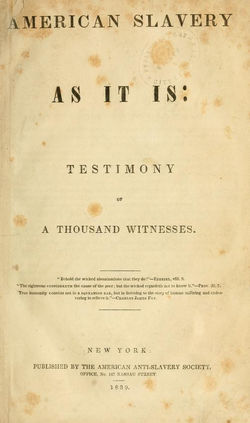
THEODORE DWIGHT WELD
“The eighth commandment presupposes and assumes the right of every man to his powers, and their product. Slavery robs of both. A man's right to himself, is the only right absolutely original and intrinsic.”
THEODORE DWIGHT WELD
Theodore Dwight Weld was one of the most influential leaders in the American abolitionist movement from 1830 to 1844. Weld co-authored a famous book called “American Slavery As It Is: Testimony of a Thousand Witnesses,” which included first-hand accounts of the horrors of slavery. The book was distributed by the American Anti-Slavery Society and helped form the foundation of the American anti-slavery movement. The book also was the direct inspiration for Harriet Beecher Stowe’s “Uncle Tom’s Cabin,” the most influential book to end slavery.
In the early 1820s, Weld traveled around the United States for several years. During his travels, Weld witnessed slavery directly. Before becoming a leader in the anti-slavery movement, Weld worked closely with several other abolitionists. For instance, in college Weld became a follower of Charles Finney, a leader in the second great awakening and revivalist movements. Additionally, Weld worked as an agent for Arthur and Lewis Tappan, two leaders in anti-slavery work, including the American Anti-Slavery Society and The American and Foreign Anti-Slavery Society.
While working for the Tappan brothers, Weld traveled thousands of miles and looked for land and faculty for the Lane Theological Seminary. Weld became a student of this school and led the “Lane Rebels,” a group dedicated to free discussion that evaluated the issue of slavery, concluding that they should support abolitionism.
Weld left his studies to pursue leadership in the American Anti-Slavery Society in 1834. Weld recruited and trained many to work for the cause of anti-slavery. However, in 1838, Weld lost his voice and began his work as an editor for the society. He published his famous book around the same time.
CENTERED ON CHRIST
Weld was a man of great faith, and his faith served as a driving force for his views on slavery. In one of his books, “The Bible Against Slavery,” Weld wrote a defense against slavery from a religious perspective. Weld stated, “God spoke the ten commandments from the midst of clouds and thunderings. Two of those commandments deal death to slavery. "Thou shalt not steal," or, "thou shalt not take from another what belongs to him." All man's powers are God's gift to him. That they are his own, is proved from the fact that God has given them to him alone,—that each of them is a part of himself, and all of them together constitute himself.”
Weld added, “The eighth commandment presupposes and assumes the right of every man to his powers, and their product. Slavery robs of both. A man's right to himself, is the only right absolutely original and intrinsic.”

